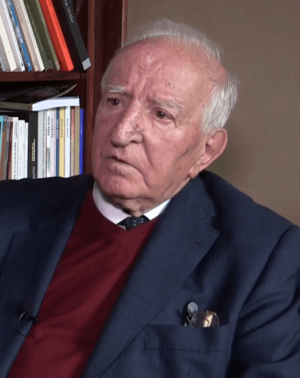Eduardo Lourenço facts for kids
Quick facts for kids
Eduardo Lourenço
|
|
|---|---|
 |
|
| Born |
Eduardo Lourenço de Faria
23 May 1923 São Pedro de Rio Seco, Almeida, Portugal
|
| Died | 1 December 2020 (aged 97) Lisbon, Portugal
|
| Nationality | Portuguese |
| Alma mater | University of Coimbra |
| Occupation |
|
|
Notable work
|
O labirinto da saudade : psicanálise mítica do destino português |
| Title | Member of the Council of State |
| Term | 2016-2020 |
| Movement | Existentialism |
| Spouse(s) | Annie Salomon |
| Parents |
|
Eduardo Lourenço de Faria (born May 23, 1923 – died December 1, 2020) was a famous Portuguese essayist, professor, and philosopher. He was known for his deep thinking and writing. He explored many ideas about Portuguese culture and identity.
Contents
Who was Eduardo Lourenço?
Eduardo Lourenço was born in a small village in Portugal. He was the oldest of seven children. His father was a Captain in the army. When Eduardo was young, his family moved to Guarda. He later attended the Military College.
What did Eduardo Lourenço study?
In 1940, Eduardo Lourenço began studying at the University of Coimbra. He loved the open and thoughtful atmosphere there. He studied History and Philosophy. In 1946, he earned his degree. He then worked as an assistant professor at the university.
During this time, he published his first book, Heterodoxia, in 1949. This book included parts of his university thesis. He also wrote articles for the Diário de Coimbra newspaper.
Where did Eduardo Lourenço work?
Eduardo Lourenço traveled a lot for his work.
- In 1949, he did an internship at the University of Bordeaux 2.
- From 1953 to 1955, he taught Portuguese Culture at universities in Hamburg and Heidelberg.
- He also worked at Montpellier University from 1956 to 1958.
- In 1954, he married Annie Salamon.
- After teaching philosophy in Brazil for a year, he moved to France in 1960.
He settled in Vence, France, in 1965. He taught at the University of Grenoble and later at the University of Nice. He retired from teaching in Nice in 1988.
What other important roles did he have?
Eduardo Lourenço held several important positions:
- From 1989 to 1991, he was a cultural advisor for the Portuguese Embassy in Rome.
- Starting in 1999, he became a director at the Calouste Gulbenkian Foundation in Lisbon. This foundation supports arts, science, and education.
In his honor, the Centre for Iberian Studies created the Eduardo Lourenço Prize in 2005. This award celebrates people or groups who have done great things for Iberian culture and cooperation.
He also signed a petition to protect the Portuguese language. This petition gathered over 115,000 signatures.
In 2015, the city of Coimbra created the Sala Eduardo Lourenço. This room in the Casa da Escrita (House of Writing) holds about 3,000 of his books.
What was the Council of State?
On April 7, 2016, Eduardo Lourenço became a member of the Council of State in Portugal. This is an important group that advises the President of Portugal. He was appointed by President Marcelo Rebelo de Sousa. Eduardo Lourenço remained a member until he passed away.
What awards and honours did he receive?
Eduardo Lourenço received many awards and honours for his work.
Honours from Portugal
He received high honours from Portugal:
 Grand-Officer of the Military Order of St. James of the Sword (1981)
Grand-Officer of the Military Order of St. James of the Sword (1981) Grand-Cross of the Order of Prince Henry (1992)
Grand-Cross of the Order of Prince Henry (1992) Grand-Cross of the Military Order of St. James of the Sword (2003)
Grand-Cross of the Military Order of St. James of the Sword (2003) Grand-Cross of the Order of Liberty (2014)
Grand-Cross of the Order of Liberty (2014)
He also received medals from the Ministry of Culture and gold medals from the cities of Coimbra and Guarda.
Honours from other countries
 Officer of the National Order of Merit (France, 1996)
Officer of the National Order of Merit (France, 1996) Knight of the Order of Arts and Letters (France, 2000)
Knight of the Order of Arts and Letters (France, 2000) Knight of the Order of the Legion of Honour (France, 2002)
Knight of the Order of the Legion of Honour (France, 2002)
Awards
Some of his major awards include:
- Camões Prize (1996) – This is one of the most important literary awards for Portuguese-language writers.
- Vergílio Ferreira Award (2001)
- Pessoa Prize (2011) – A very important award in Portugal for people who have made significant contributions to Portuguese culture.
- European Essay Prize Charles Veillon (1988)
Academic Honours
He received honorary doctorates from several universities, including:
- Federal University of Rio de Janeiro (1995)
- University of Coimbra (1996)
- Universidade Nova de Lisboa (1998)
- University of Bologna (2007)
The University of Bologna also created the Eduardo Lourenço Chair in the History of Portuguese Culture in 2007. This shows his lasting impact on academic studies.
See also
 In Spanish: Eduardo Lourenço para niños
In Spanish: Eduardo Lourenço para niños
 | Selma Burke |
 | Pauline Powell Burns |
 | Frederick J. Brown |
 | Robert Blackburn |

